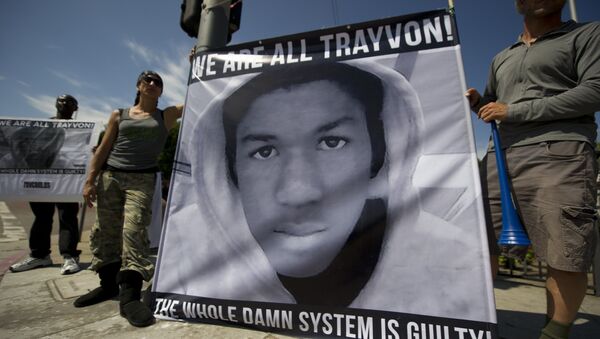Four years ago, 28 year old Florida native George Zimmerman shot and killed an unarmed African American teenager named Trayvon Martin as the boy was making his way home from a local convenience store. After a lengthy and controversial trial, Zimmerman was acquitted – a decision that still baffles many in the States and around the world, including the Trayvon Martin Foundation Executive Director Troy E Wright.
“Trayvon goes to the store, picks up his skittles, his Arizona ice tea, in a gated community, comes back – he’s being followed, and he dies. He was trying to get back to watch the game. As much as people want to call him a thug – how can you be a thug if you just go to the store and are trying to get home? And it was raining outside. So what, you’re not supposed to put on your hood? And yet you have someone like George Zimmerman who just gets to walk.”
Wright joined the foundation in 2015, three years after Trayvon Martin’s parents Tray and Sybrina started the project. Together, they’ve brought the non-profit foundation – and with it, a very serious social problem – into the spotlight.
The workshops, seminars and support groups the foundation provides are targeting all possible influences on youths, violence and police brutality: individual, communal and social factors. “We’re trying to teach people about financial literacy, how to be an entrepreneur, how to be better parents, how to get a degree”, says Wright. But he also believes there needs to be a dialogue between police and community members for the situation to change.
“We have to find a way for the police and the community to talk on the same level, and I think one way is for the policemen to come out of the area that they serve. Or maybe have policemen work in a community organization. Be a part of the community. Create a platform where the parents are talking to the police, it could make a big difference. And then you let the kids know that they no longer have to be afraid of the police.”
Being afraid of the police might sound exaggerated, until you look at the numbers. In 2015 alone, over 1000 young black men were shot and killed by police officers in the US. The death rate for young black men is five times higher than white men of the same age.
“I don’t have a record. I’ve never been to jail, I’ve never done anything wrong,” Wright tells Sputnik. “I should not be afraid if a police officer pulls up next to me. I should not be afraid.”
His apprehension is understandable once statistics enter the fray. In 2015, in the state of Florida alone, nearly 100 black men were killed by police officers. Not one of them has been convicted.
“Until you start prosecuting people that are supposed to protect you and are just murdering people, what can be done? In the state of Florida, has any officer ever been convicted? No. But as soon as you start holding them accountable for their actions, then I think things will change. Unless you hold the people responsible for doing things they should not be doing. You can’t expect them to change when they don’t have to.”
The change, however, has already begun. Black Lives Matter, The Black Youth Project 100, Dream Defenders – all those activist movements were borne in the wake of Trayvon Martin’s death, all of them drawing the world’s attention to racial injustice in the US. Thanks to them people like Michael Brown, Tamir Rice, Eric Garner, Akai Gurley and many others didn’t get ignored when they died at the hands of local law enforcement officers- they made headline news around the world. Thanks to them, there is more and more talk of accountability – body cameras for law enforcement, sensitivity training and more.
Four years ago today, #TrayvonMartin's murder inspired conscious awakening & a new generation of black activism. RIP pic.twitter.com/jBL8txT4Ba
— D (@Delo_Taylor) February 26, 2016
While few realistically expect things to change overnight, the global spotlight that has now been turned onto America's unbalanced justice system gives some room for optimism.
“Things are going to get worse before they get better,” says Wright. “But I have hope. I have got to have hope.”


